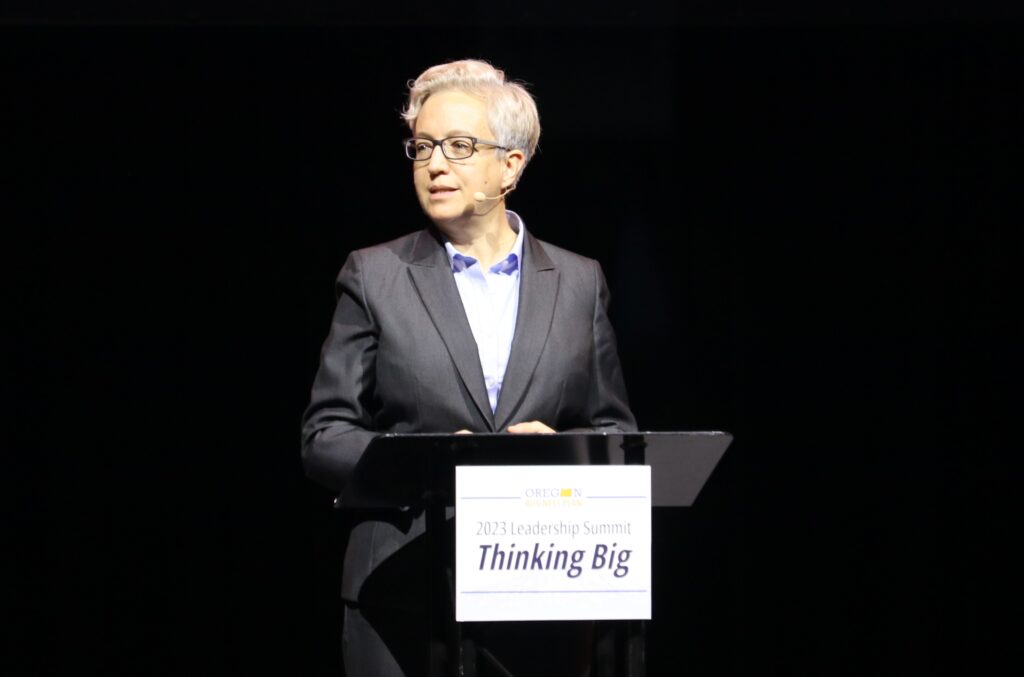
Gov. Tina Kotek spoke several times at the Oregon Business Plan’s 2023 Leadership Summit on Monday in Portland. She emphasized the importance of summer learning and community partnerships to improve education, which ultimately helps Oregon businesses. (Photo by Jake Arnold, OSBA)
Education was on the minds of Oregon’s leaders Monday.
The 2023 Leadership Summit asked business, nonprofit and political leaders where they should get involved in the year ahead. “Strengthen K-12 Education Performance and Accountability” was the clear favorite from among 10 choices, included by roughly 53% of the more than 700 responses.
Rep. Ben Bowman, D-Tigard, said the business community’s response shows “there’s an opportunity in our near future to invest in our education system.” Bowman is a former Tigard-Tualatin School Board member.
The summit is a product of the Oregon Business Plan, an economic forum to discuss policies and improve Oregonians’ prosperity. Improving post-secondary education access is among its recent initiatives.
Monday’s “Thinking Big” event at the Moda Center was more an inspiring rally to generate ideas than an action plan. The agenda had two main topics: restoring Portland, Oregon’s economic engine, and connecting education with economic development.
Gov. Tina Kotek was among the political leaders taking the stage. She said Oregon needs to do a better job of investing in structured and enriching summer learning.
“I know there are some legislators in the room. We will be talking about summer in the 2024 session,” she said.
Kotek also praised schools’ increasingly sophisticated career and technical education programs for offering students more post-secondary options. She thanked the room’s business owners for the corporate activity tax proceeds that provided more than $2.3 billion last biennium to support education through the 2019 Student Success Act.
During a separate session, House Speaker Dan Rayfield acknowledged Oregon still has work to do on funding K-12 education. He said the state needs to figure out how to come to agreement on the proper level of education funding.
Rayfield pointed to the Portland Public Schools teachers strike. The $10.2 billion State School Fund was close to what school business leaders and OSBA said districts needed to maintain current staff and programs. Education advocates warned, though, that it wouldn’t be enough for all schools’ needs. PPS said it did not get enough money to meet teachers’ raise and other requests, leading to the strike.
Other districts are also saying they will need to make cuts. Salem-Keizer Public Schools recently announced $31 million in cuts and layoffs to try to close a budget shortfall. The district is in contract negotiations with its teacher and classified staff unions, which could further affect its budget.
The day’s agenda included a panel discussing school partnerships with businesses to shore up school programs.
Hillsboro School District Superintendent Travis Reiman, a panel member, said his district has engaged individual local employers for support.
“Investing in our CTE programs is not a charity case; it’s a talent strategy,” he said.
Casey Layton, Clackamas Community College chief diversity, equity and inclusion officer, was among the education professionals in the audience. She said she wants to learn more about how colleges can align all students’ learning with business community needs.
“The key to economic development is the training of our workforce,” she said.
Several OSBA Board members attended the summit, including President Sonja McKenzie (Parkrose School District) and President-elect Sami Al-Abdrabbuh (Corvallis SD).
McKenzie said she loves seeing community leaders and elected leaders discussing education as essential to making Oregon better.
Legislative support for summer learning and community partnerships to fill the school funding gaps are crucial, McKenzie said.
“Education – we can’t do it alone,” she said.
– Jake Arnold, OSBA
[email protected]